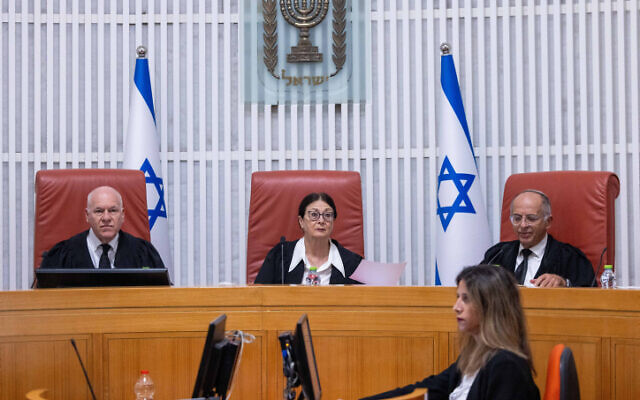As the Knesset panel drafting the first salvo of judicial reform legislation moved into preparing the bill for its preliminary plenum vote, the head of the committee reaffirmed the coalition’s intention to push bills through its first reading without incorporating significant legal adviser or opposition input.
“I think the correct time to put changes in… is in preparation for the second reading” in the Knesset plenum, said Constitution, Law, and Justice Committee chair Simcha Rothman to fellow panel members on Wednesday, reaffirming his and Justice Minister Yariv Levin’s intention to push the legislation through the first Knesset vote as quickly and with as few changes as possible.
Following an opposition filibuster, the committee announced that it would aim to vote by Monday to approve the bill to change Basic Law: The Judiciary for its first reading on the Knesset floor to take place later that same day. As it is not a private member’s bill, it did not require a preliminary reading.
After clearing its first floor vote, it will return to the committee for debate before its second and third, final, Knesset votes.
The bill is a pared down version of what Levin has called the “first phase” of his yet-to-be-disclosed full reform plan, which already will strengthen the government and Knesset at the expense of the judiciary. Written by Rothman and pitched as a bill sponsored by the Constitution Committee, the bill will give the government control over judicial appointments and remove the court’s jurisdiction to review legislation passed as Basic Laws.
Get The Times of Israel's Daily Edition by email and never miss our top stories
A separate bill to create an override clause to let the Knesset reinstate laws struck down by the High Court of Justice is expected to be introduced as a private member’s bill by Rothman as early as next week, according to the Religious Zionism lawmaker’s office. Also cleaved off from the original combined draft is a plan to cancel the judicial test of reasonableness, and the coalition does not currently have a concrete timeline for reintroducing it as part of a bill.

Knesset Constitution, Law, and Justice Committee chairman Simcha Rothman (L) and Justice Minister Yariv Levin attend a meeting of the panel on January 11, 2023. (Yonatan Sindel/Flash90)
Rothman took over drafting the bill from Levin, after the Justice Ministry — required for drafting a government-sponsored bill — said it needed significant time to evaluate Levin’s proposal and prepare a draft. Emanating from the Knesset, the Constitution Committee’s bill does not need to submit to judicial oversight at this stage, and has even dodged the Constitution Committee legal adviser’s own criticism.
“Indeed, the legal adviser to the committee suggested that the members of the committee consider setting various limits, plans, and procedures on Basic Law legislation,” Rothman wrote in a Tuesday evening letter to his fellow committee members. “Regardless, I am satisfied that in this stage of legislation it would not be appropriate to include arrangements of these types in the bill, without arguing about correct points that the committee’s legal adviser made.”
In line with Rothman and Levin’s promises that the time for debate will be after the legislation passes the hurdle of its first reading, coalition sources said that the bills were split in order to “enable discussion” on their component pieces. Opposition staffers, however, said they suspect the bills were split to quiet public opposition that centers largely on the override clause, which has translated into mass protests, professional warnings about economic destruction, and a planned workforce strike on Monday.
They also said that the split may be a strategy against expected petitions to the High Court of Justice, which might have to review the reform plan piecemeal, rather than as a unified package.
Judicial selection within government control
The proposed bill will cement government control over the panel charged with appointing all of Israel’s judges. The Constitution Committee’s former head, Labor MK Gilad Kariv, warned Wednesday that “we are on our way to a succession of political appointments [of judges].”

The Supreme Court convenes for a hearing on the Central Election Committee decision to disqualify Likud party member Amichai Chikli from running in the upcoming Knesset election, October 6, 2022.
The updated proposal will reshuffle seats in the current nine-person Judicial Selection Committee, dividing representation equally to the Knesset, government, and judiciary. This significantly weakens professional power, taking two seats away from the Israel Bar Association and knocking it out of the process. Furthermore, it lowers the bar from a seven-member supermajority to a simple majority of five, letting the government — which controls the coalition — push through its candidates.
According to the bill, the justice minister will continue to chair the panel, and be joined by two ministers of the government’s choosing. The panel will also have three lawmakers: the head of the Constitution Committee, a second MK from the coalition, and one from the opposition.
Although it has long been customary to include an opposition member among the selection panel’s ranks, this will be the first time it is instantiated in law, according to Rothman.
But as a Yesh Atid opposition party MK pointed out to the committee, “in this makeup, the opposition is meaningless.”
The Supreme Court president will represent the judiciary, alongside two retired judges, in place of two current Supreme Court justices. The justice minister will choose the judges on the panel, but will obtain the Supreme Court president’s approval for his picks.
No more court oversight of Basic Laws
The bill includes a provision revoking court jurisdiction to evaluate Basic Laws.
“Those who have judicial authority according to law, including the Supreme Court, will not be made, directly or indirectly, to weigh in on the validity of a Basic Law, and there will be no validity to a decision made in such a matter,” the bill, itself a Basic Law, states.
The Supreme Court elevated Basic Laws to a quasi-constitutional status, in lieu of Israel’s never-written constitution.
However, unlike a constitution, Basic Laws are passed with either a simple majority or an absolute majority of 61 MKs — depending on the content of the law — and can be changed just as easily by a coalition holding a majority of the Knesset’s seats.
Despite elevating Basic Laws beyond judicial oversight in his committee’s bill, Rothman himself acknowledged that Basic Laws were not a constitution in January, in his first remarks upon taking control of the committee.
Calling the foundational Basic Laws only a “‘constitution’ in quotation marks, which was not established by the people,” Rothman told the committee that its own authority “does not include the establishment of a constitution for the state, no matter how many times the court repeats this argument.”
If passed, the curb on the court’s jurisdiction means that the Knesset can proactively create judicial immunity for laws if they pass as Basic Laws.
One potential new Basic Law appearing in coalition agreements would promote Torah study, potentially laying a foundation for legally restoring sweeping ultra-Orthodox exemptions from mandatory military conscription.


